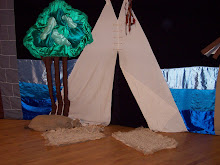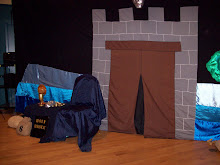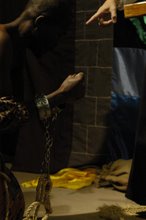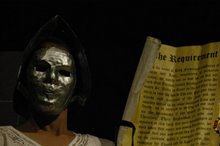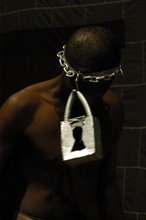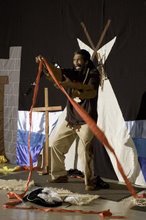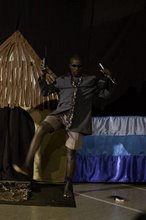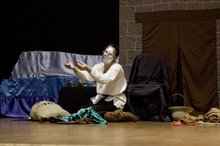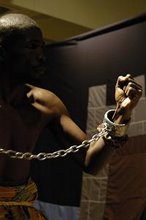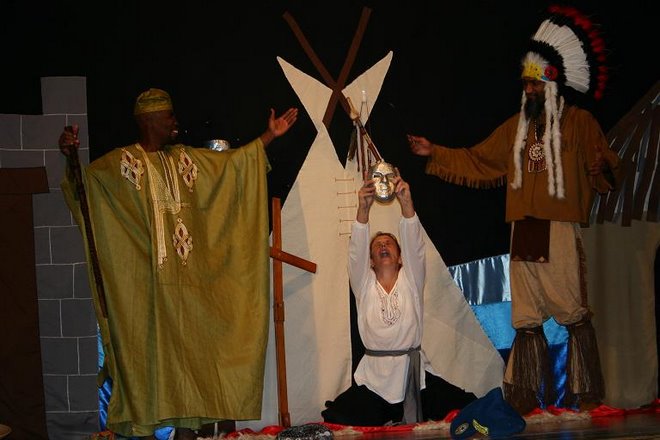The N a Sonje Foundation presents Three Innocents and a spirit, a historical drama depicting the interactions of the peoples from the Americas, Europe, and Africa from before the time of Christopher Columbus, and the cultural crises that developed as a result. The cast engages in a post-production discussion, creating an open forum for ideas and solutions that can help towards the healing of our fractured societies.
Three Innocents and a spirit is performed by a team of Haitian men and women representing the Native American and African cultures, respectively, and an American woman representing the European culture. Dressed in symbolic costumes, the actors weave together mime, interactive participation, authentic historical texts and music to demonstrate the progression and effect of historical events.
The play exposes the destruction and acculturation of the Native Americans and the enslavement of Africans, which resulted in a transfer of wealth and natural resources to Europe. During the drama the Native American, European, and African characters experience a transformational awakening through which they realize their physical and spiritual losses, as well as their mutual need for one another. The three characters then offer each other gestures of compassion and forgiveness, ultimately recognizing the need for healing and reconciliation.
This drama is a highly stylized and portrays in simple form the lives of the native peoples of 3 continents and their mutual history. "N a Sonje's" intentions are to reconnect us to events and their lasting results rather than to define or describe any one particular culture, tradition, historical event or dates in precise detail but our desire is that through mime, music and limited resources a moment of deep reflection about our collective histories can be used to dream of a future of peace. This is "N a Sonje's" hope. Most of the colonial depiction is taken from a Haitian historical perspective which embraces the same spirit of revolt against domination felt everywhere.
"3 Innocents" is performed to a soundtrack that has only three narrative texts. but since the actions are mimed to music and sound effects of well-known historical events, the heart knows the rest!
The N a Sonje Foundation speaks at high schools, colleges, universities, churches, businesses and organizations, as well as with local and national media about Haiti and its special role in this historical context.
Three Innocents and a spirit is performed by a team of Haitian men and women representing the Native American and African cultures, respectively, and an American woman representing the European culture. Dressed in symbolic costumes, the actors weave together mime, interactive participation, authentic historical texts and music to demonstrate the progression and effect of historical events.
The play exposes the destruction and acculturation of the Native Americans and the enslavement of Africans, which resulted in a transfer of wealth and natural resources to Europe. During the drama the Native American, European, and African characters experience a transformational awakening through which they realize their physical and spiritual losses, as well as their mutual need for one another. The three characters then offer each other gestures of compassion and forgiveness, ultimately recognizing the need for healing and reconciliation.
This drama is a highly stylized and portrays in simple form the lives of the native peoples of 3 continents and their mutual history. "N a Sonje's" intentions are to reconnect us to events and their lasting results rather than to define or describe any one particular culture, tradition, historical event or dates in precise detail but our desire is that through mime, music and limited resources a moment of deep reflection about our collective histories can be used to dream of a future of peace. This is "N a Sonje's" hope. Most of the colonial depiction is taken from a Haitian historical perspective which embraces the same spirit of revolt against domination felt everywhere.
"3 Innocents" is performed to a soundtrack that has only three narrative texts. but since the actions are mimed to music and sound effects of well-known historical events, the heart knows the rest!
The N a Sonje Foundation speaks at high schools, colleges, universities, churches, businesses and organizations, as well as with local and national media about Haiti and its special role in this historical context.


